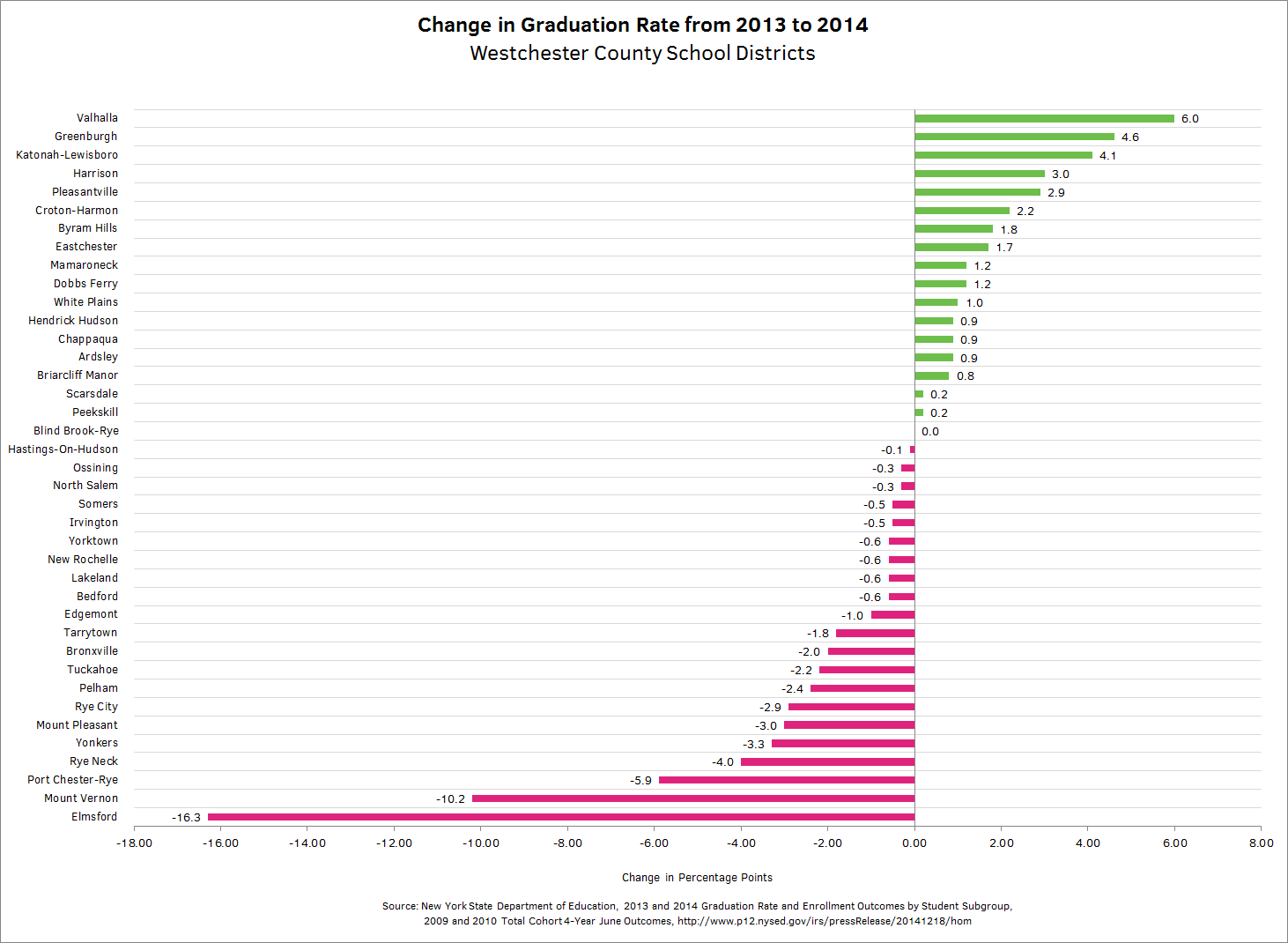If you haven’t already seen the 2014 graduation and college readiness rates for Westchester’s school districts, be sure to take a look at this infographic we created to summarize the latest data. You might also be interested in another infographic from Lohud, which provides graduation rates by high school.
While the statewide graduation rate rose slightly to 76%, Westchester County’s graduation rate held steady at 85%. Yet when you drill down to the district level, it becomes clear that we’ve got quite a mixed bag when it comes to changes in the graduation rate from 2013 to 2014:
- 12 districts experienced drops in their graduation rate of 1% or more.
- 16 districts’ rates stayed roughly the same (up or down by less than 1%).
- 11 districts saw increases of at least 1% in their rates.
The chart below depicts the change in percentage points from 2013 to 2014 for each district’s graduation rate. A positive number (green) means the rate increased, while a negative number (pink) means the rate decreased.
For example, Valhalla’s graduation rate increased the most among Westchester districts, going up 6 points from 91% to 97%. Elmsford’s rate dropped by the largest amount (16 points), falling from 88% to 72%. Mount Vernon and Port Chester-Rye districts also experienced significant drops (10% and 6% respectively).
Click the chart to view a larger version.
So what should we make of this data?
While the countywide graduation rate exceeded the statewide rate, we can’t forget that five of our districts’ rates fell below the New York state graduation rate (Elmsford, Mount Vernon, Peekskill, Port Chester-Rye, and Yonkers). And as we’ve written about before, it’s important to remember that even if a student succeeds in graduating from high school, there’s less than a 50% chance that they are ready for a career or college.
A recent study by Yonkers Partners for Education underscored the well-established reality that poverty is a major obstacle to students’ academic success. It also serves as a reminder that helping students graduate is not enough to ensure that they will be successful in life after graduation. Stay tuned for upcoming observations from our Executive Director, Cora Greenberg, in response to the Lohud article about the study.
Note: In order to capture the percentage of students who graduate on time, we’ve chosen to use the 4-year June graduation rate, rather than the 4-year August, 5-year, or 6-year graduation rates.




Pingback: Facts About Westchester Graduates - Westchester Children's Association
Excellent point about the danger of using poverty as an excuse for low expectations. Thanks for sharing your thoughts. While poverty is strongly correlated with students’ academic performance, it’s certainly not an insurmountable obstacle.
The YPIE study found a number of schools that are both high-poverty and high-performing. Their goal is to identify the variables that are enabling these schools to help their students succeed in spite of poverty.
If we can learn more about the schools that outperform their high-poverty peers, we’ll be better equipped to disrupt the high-poverty/low-success trend.
Port Chester is the worst district ever. They blame poverty and ELLs for their horrible test scores and terrible graduation rates. Hire more qualified people and get rid of the bilingual crap. Admin sucks too.
Poverty is often used as an excuse by administrators who don’t believe that all students can and must achieve. There are many schools with poor children that invest the resources to teach to the unique learning styles of students and provide learning supports to insure success.
When you push back on poor performance, they almost always cop to “well we don’t have the money for that.” So it isn’t about student poverty it is about the school districts.
Poverty of ideas, energy and commitment to student achievement should be attacked to eradicate what George W. Bush called the “soft bigotry of low expectations.” (this is one of the only things he ever said that I agree with)